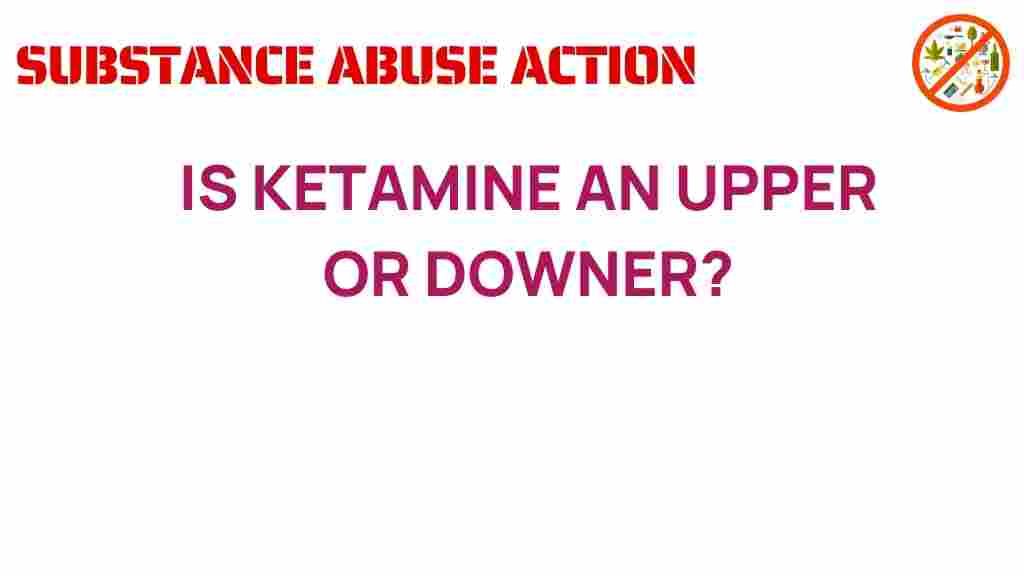Understanding Ketamine: Addiction, Mental Health, and Treatment
Ketamine is a medication that has gained significant attention in recent years, particularly in the realms of addiction, mental health, and treatment for various mood disorders. Originally developed as an anesthetic, it has shown promise as a treatment for depression, anxiety, and PTSD. However, its unique properties also classify it as both an upper and a downer, leading to a complex dual nature that can affect individuals differently. This article explores the multifaceted effects of ketamine, its potential for addiction, and its role in mental health recovery.
What is Ketamine?
Ketamine is classified as a dissociative anesthetic, which means it can induce a trance-like state and alter sensory perception. It is commonly known for its use in medical settings for pain management and anesthesia. However, its psychoactive effects have led to its misuse as a recreational drug, contributing to its classification as a controlled substance in many regions.
The Effects of Ketamine
Ketamine’s effects can vary widely depending on the dosage and the context in which it is used. These effects can be classified into several categories:
- Uppers: At lower doses, ketamine can produce feelings of euphoria and heightened energy, often referred to as “mood enhancement.” Users may experience increased sociability and a sense of well-being.
- Downers: At higher doses, ketamine can induce sedation, confusion, and dissociation, leading to a trance-like state. This can result in a “floating” sensation and altered perceptions of time and space.
- Psychedelic Effects: Some users report vivid hallucinations and altered states of consciousness, which can lead to profound insights or a feeling of connection with the universe.
The Dual Nature of Ketamine
The dual nature of ketamine as both an upper and a downer makes it a unique substance in the landscape of mental health treatment. While its mood-enhancing properties can help alleviate symptoms of depression and anxiety, the potential for addiction and misuse cannot be overlooked.
Ketamine and Mental Health Treatment
Research has shown that ketamine can be effective in treating various mental health conditions, particularly for individuals who have not responded to traditional antidepressant therapies. Here are some key points regarding its use in mental health treatment:
- Rapid Relief: Unlike traditional antidepressants that may take weeks to show effects, ketamine can provide rapid relief from depressive symptoms within hours.
- Treatment-Resistant Depression: Ketamine has been particularly beneficial for those suffering from treatment-resistant depression, providing hope for individuals who have exhausted other options.
- PTSD and Anxiety: Emerging research suggests that ketamine may help reduce symptoms of PTSD and anxiety, offering a new avenue for treatment.
Understanding Ketamine Addiction
Despite its potential benefits, ketamine also poses risks of addiction. Understanding these risks is crucial for anyone considering its use for mental health treatment.
Signs of Ketamine Addiction
Recognizing the signs of addiction is essential for early intervention and treatment. Common indicators of ketamine addiction include:
- Increased Tolerance: Needing larger doses of ketamine to achieve the same effects.
- Withdrawal Symptoms: Experiencing cravings and withdrawal symptoms when not using the drug.
- Neglecting Responsibilities: Failing to fulfill obligations at work, school, or home due to substance use.
- Continued Use Despite Consequences: Persisting in use even when facing negative health effects or relationship issues.
Step-by-Step Process for Ketamine Treatment
If you or someone you know is considering ketamine treatment for mental health issues, it is essential to follow a structured approach:
1. Consultation with a Healthcare Provider
Discuss your mental health history and treatment goals with a qualified healthcare provider. They can help determine if ketamine treatment is appropriate for you.
2. Choosing a Treatment Setting
Ketamine can be administered in various settings, including:
- Medical Clinics: Supervised by medical professionals who monitor the treatment process.
- At-Home Treatments: Some providers offer at-home treatment options, but this requires careful consideration and monitoring.
3. Administration of Ketamine
Ketamine can be administered through several methods, including:
- Intravenous (IV) Infusion: The most common method, allowing for precise control over dosage.
- Intranasal Spray: A less invasive option that can be used for outpatient treatment.
- Oral Tablets: Available but may have less predictable effects compared to other methods.
4. Monitoring and Follow-Up
Regular follow-up appointments are crucial to monitor progress and adjust treatment as needed. This can help prevent misuse and address any side effects.
Troubleshooting Tips for Ketamine Treatment
While ketamine can be effective, it is essential to be aware of potential challenges during treatment. Here are some troubleshooting tips:
- Communicate with Your Provider: Always share your experiences and any side effects with your healthcare provider for adjustments to your treatment plan.
- Avoid Mixing Substances: Do not combine ketamine with other substances, particularly alcohol or recreational drugs, as this can increase the risk of adverse effects.
- Seek Support: Engage in therapy or support groups to help process your experiences and feelings during treatment.
Conclusion: The Future of Ketamine in Mental Health
Ketamine’s dual nature as both an upper and a downer presents unique opportunities and challenges in the realm of mental health treatment. While it offers rapid relief for many individuals suffering from depression, anxiety, and PTSD, the potential for addiction and misuse necessitates careful monitoring and assistance from healthcare professionals.
As research continues to unfold, understanding the distinctions in how ketamine affects mood and mental health is crucial. With proper guidance, ketamine can be a powerful tool in the recovery journey for those who need it. Always consult with a healthcare provider to ensure that any treatment plan aligns with your individual needs and circumstances.
For more information about ketamine treatment and mental health, you can visit this resource or contact a healthcare professional for personalized advice.
This article is in the category Treatment and created by SubstanceAbuseAction Team
